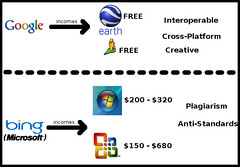 Image via Wikipedia
Image via Wikipedia
How Google Chrome OS Could Beat Windows
Source: pcworld.com
If Google really wants to compete with Microsoft, it needs to join 'em to beat 'em.
Michael Scalisi, PC World
Google recently stated that it is developing a new Linux-based OS called Chrome to run on both netbooks and desktops. In order for Google to seriously challenge Microsoft’s dominance, it needs two things. First, it needs to be seriously awesome. Second, it needs to be compatible with Windows Apps.
I must confess that when I heard about the OS, my first thought was “Oh great, just what we need, another Linux distro.” Then I realized two things: Apple has already demonstrated that its possible to build an awesome and unique OS based on UNIX, and, this is Google we’re talking about.
I believe that the Chrome OS can be awesome. That it’s named Chrome is telling. For those who haven’t used the Chrome browser yet, it’s incredibly fast, extremely simple and intuitive, yet strangely powerful. It gives you what you need before you ask for it based on what you’ve done in the past. All within an attractive, simple interface.
The Google Chrome OS is likely to be just like that. I’d expect the file system to resemble Gmail, using labels instead of folders. I’d expect eye-candy to be at a minimum and for performance to be highly optimized. I’d expect bloat to be ripped out by its roots and hastily discarded. It will capitalize on the cloud-computing model and leverage Google’s existing Web services. Imagine turning your computer on, and within 10 seconds you’re browsing the Web. That would be awesome.
All this might be enough to make a dent in the netbook market. After all, people might be willing to sacrifice the ability to use their Windows apps on a computer that was never meant to be anything more than a cheap and small web appliance. Never mind that consumers have already rejected Linux on the netbook.
Even if Chrome OS is utterly mind-blowing, if it lacks Windows application compatibility, it will merely be competing for a share of the high single-digit to low double-digit market share that Apple and Linux currently battle over. I highly doubt this is Google’s intention.
Windows dominates because it has become the lowest common denominator for application compatibility. The vast majority of commercial desktop application developers write for Windows because that’s what 90 percent of all consumers use. Consumers choose it because they invariably need to use some application that runs only on Windows. It’s a self-perpetuating cycle that needs something more than just a better competing OS to break.
As great of an idea cloud computing is, it isn’t going to eliminate the need for local apps anytime soon. If Google wants the Chrome OS to have any shot at desktop dominance, it needs be able to run Windows apps.
There are a couple of different ways to approach this. One possible alternative is to dump all sorts of resources into Wine development. This would be great since it would also give Linux and OS X a boost. Unfortunately, it will be nearly impossible to improve Wine to the point where it achieves anywhere near 100 percent Windows application compatibility.
The more likely alternative is to enable the Chrome OS to run Windows apps virtually like what is currently possible with VMware Fusion or Parallels. Of course the challenge here is that this will still require a Windows license.
The way I envision it, people will install the Chrome OS on their Windows PCs. Chrome will then repartition your drive, install its own boot loader, and set itself as the default OS. This is what most Linux distributions do already.
Users will then boot their computer into Google’s OS, and within seconds be able to use the Chrome browser and web-based apps. When the user needs a Windows app, they click on the icon for it and Chrome loads Windows in the background. The app might take a minute or so to load, but the process will be transparent otherwise. Just like VMware fusion or Parallels.
After Chrome OS finds its way onto a few million desktop computers, application developers will start porting Windows apps over to Chrome. Once Chrome is available on a majority of computers, developers will develop for Chrome first and Windows will quickly slip into obscurity. Give this process about a decade.
Michael Scalisi is an IT manager based in Alameda, California.


![Reblog this post [with Zemanta]](http://img.zemanta.com/reblog_b.png?x-id=db6908c9-5373-4abb-8734-38e475287efc)


![Reblog this post [with Zemanta]](http://img.zemanta.com/reblog_b.png?x-id=1490dc5e-256c-444a-8411-45884b506645)

![Reblog this post [with Zemanta]](http://img.zemanta.com/reblog_b.png?x-id=be9ae7b0-5349-44d7-a680-5feb83a7f0e0)

![Reblog this post [with Zemanta]](http://img.zemanta.com/reblog_e.png?x-id=733e9298-41be-41ed-a191-66f2e4dffd78)

![Reblog this post [with Zemanta]](http://img.zemanta.com/reblog_e.png?x-id=24d8e48c-8be0-4a5d-a315-5fd4e73eebbe)

![Reblog this post [with Zemanta]](http://img.zemanta.com/reblog_b.png?x-id=389b7b52-d420-42b5-8a67-74235bb32c36)

![Reblog this post [with Zemanta]](http://img.zemanta.com/reblog_b.png?x-id=b2d50e8f-7232-437d-921b-9e0676f2505e)